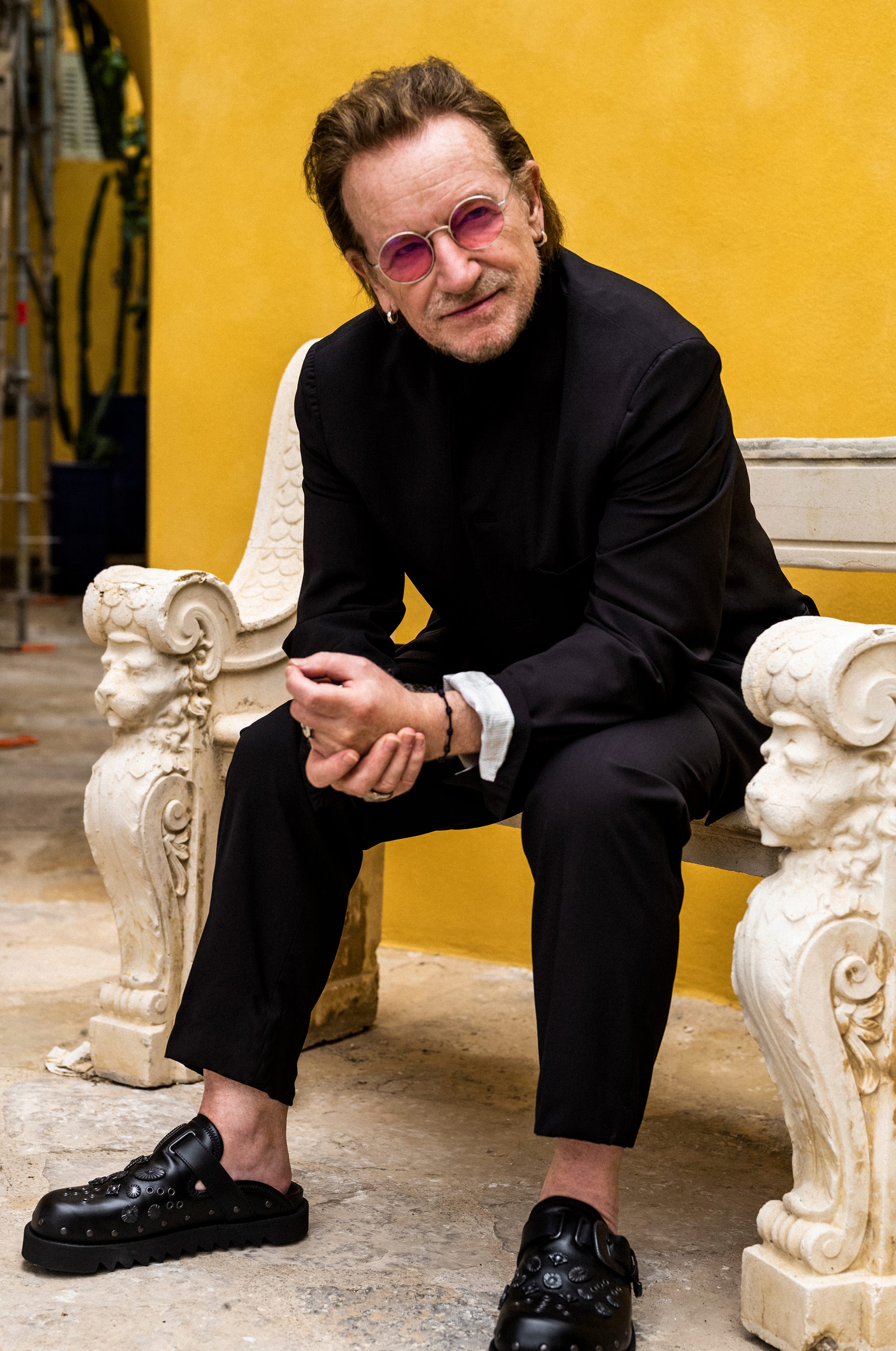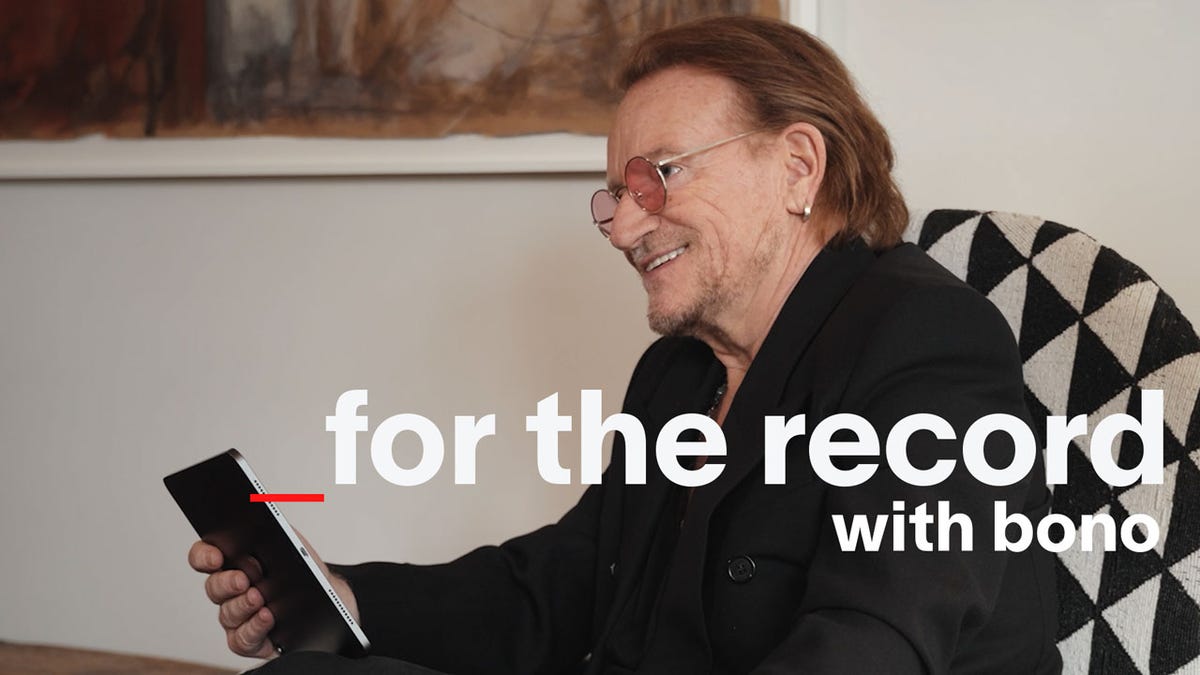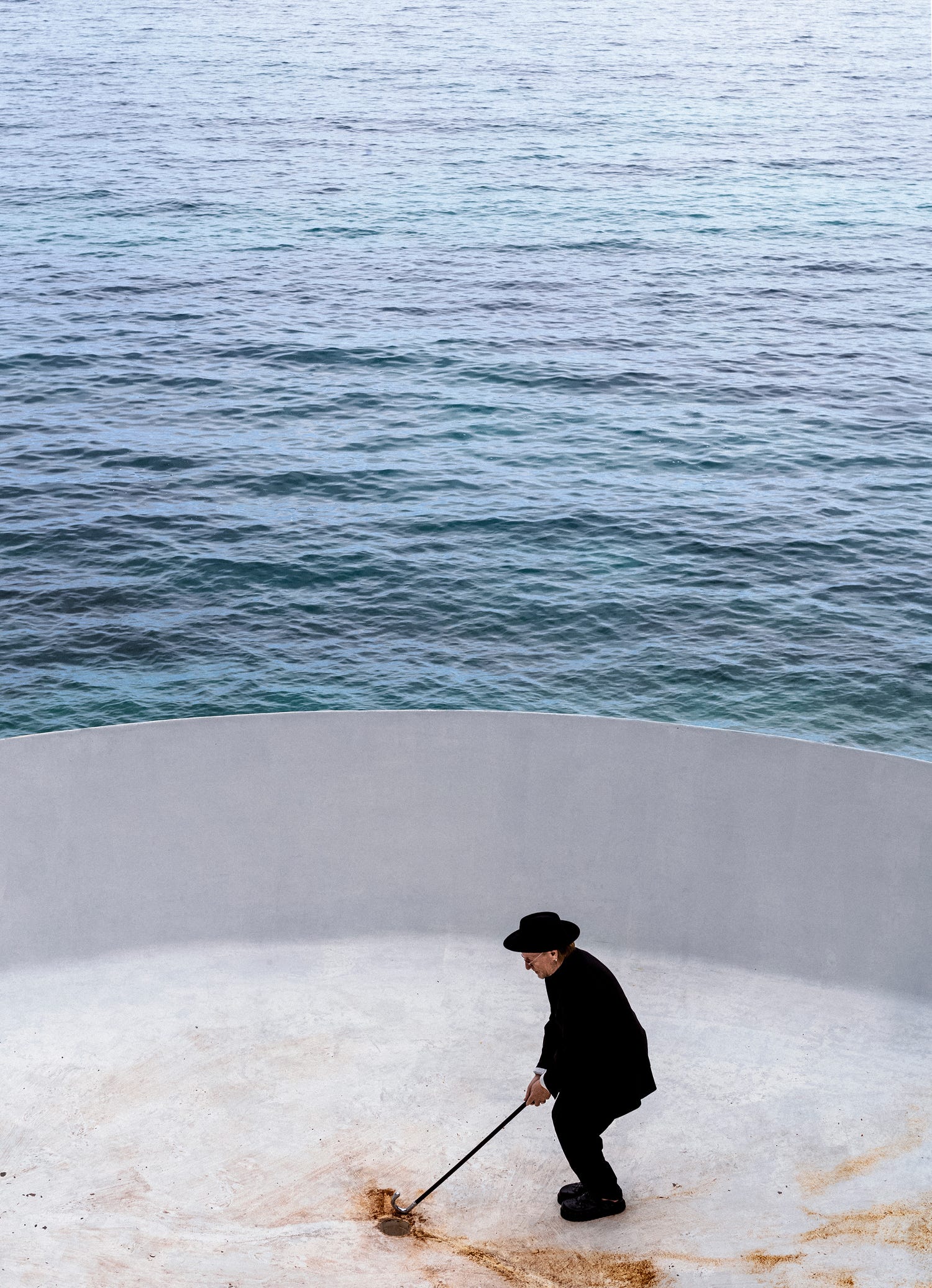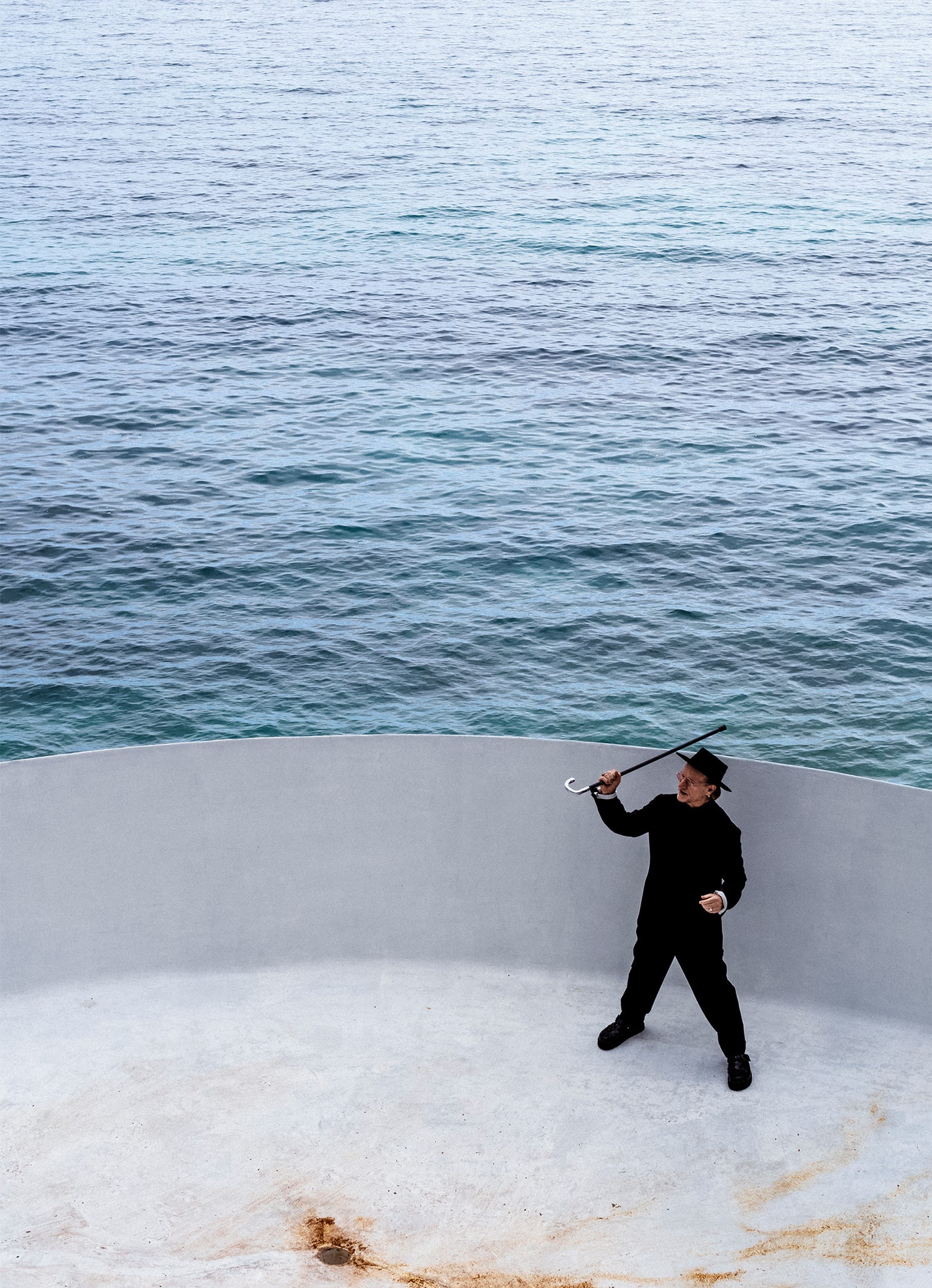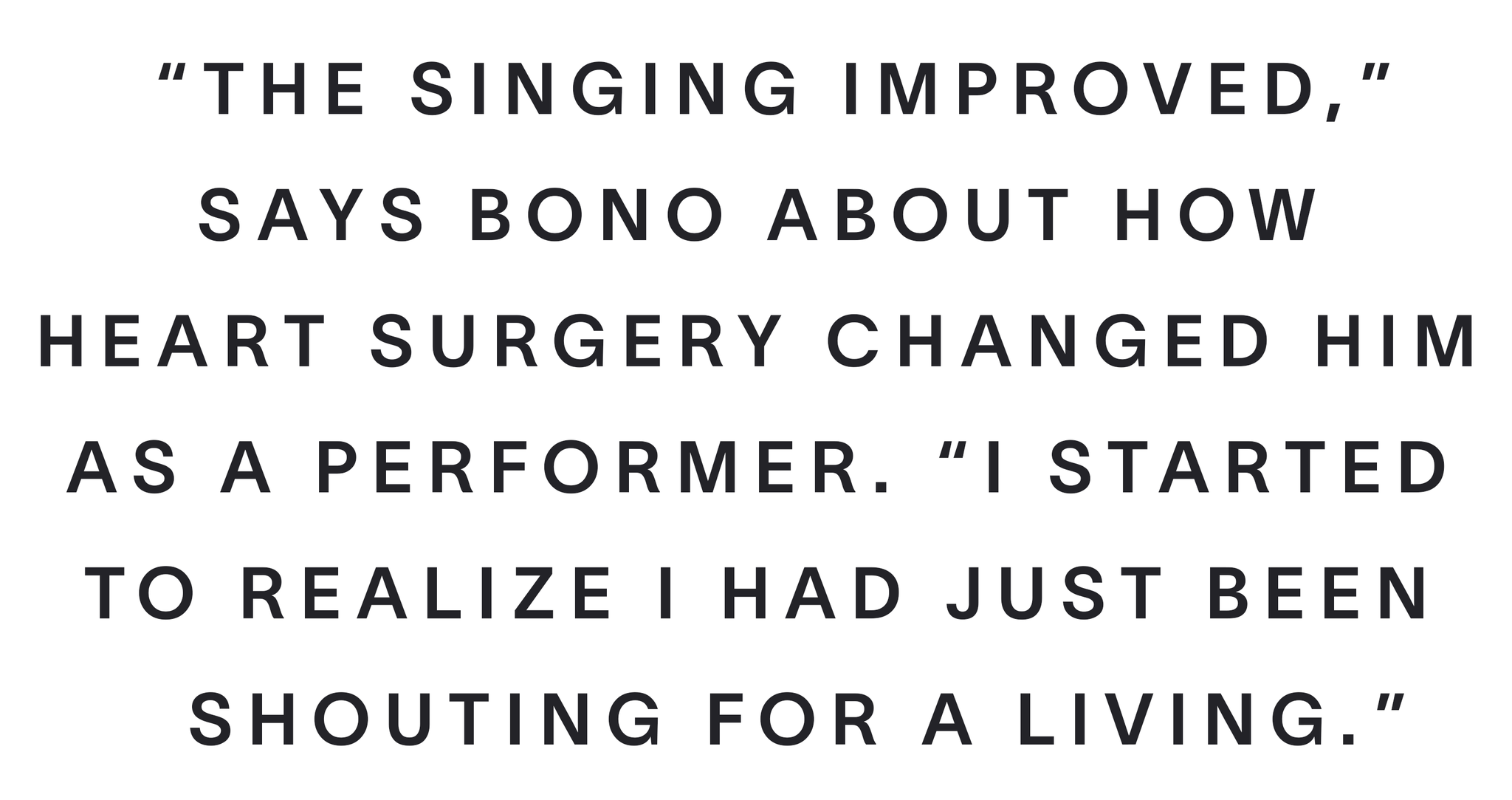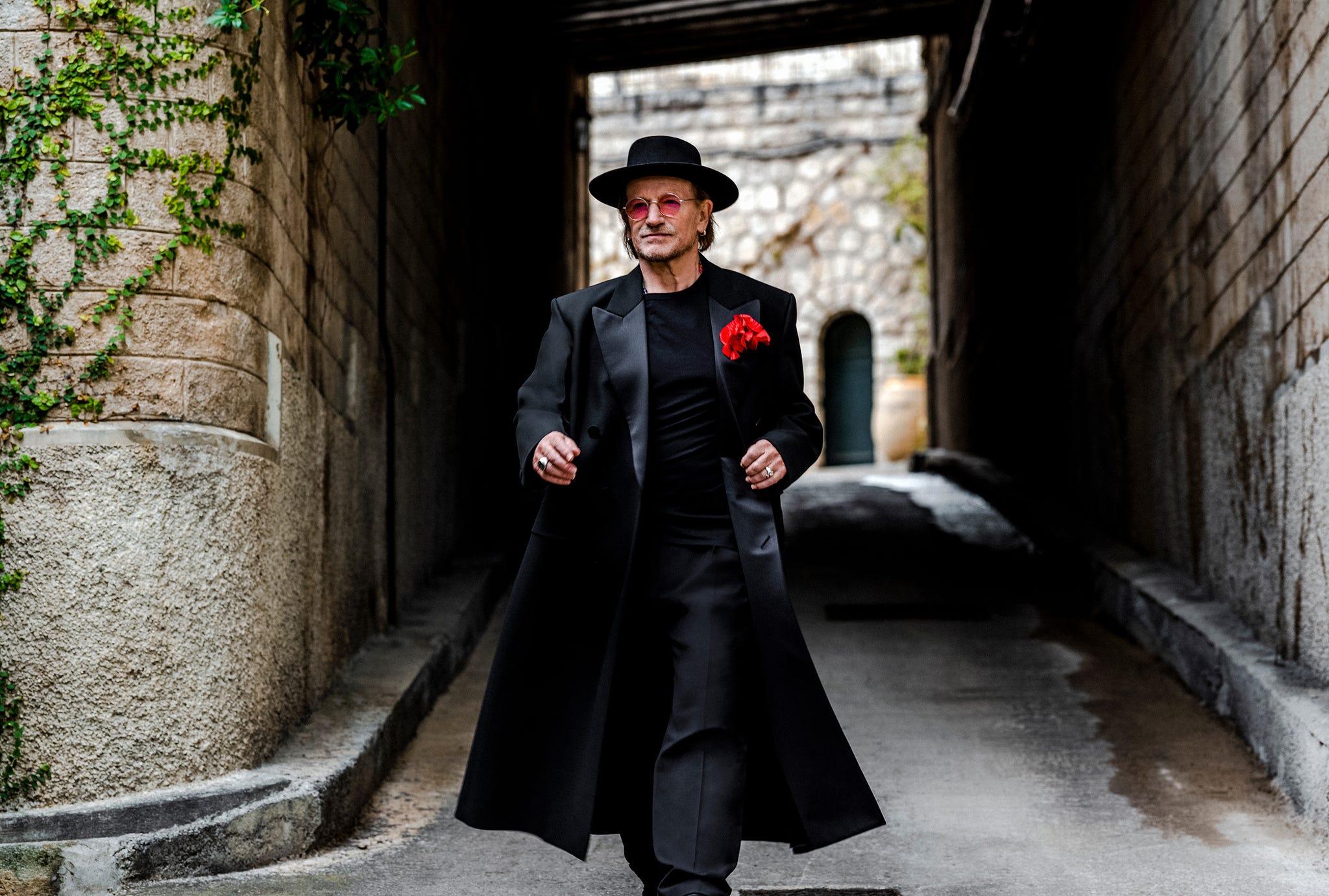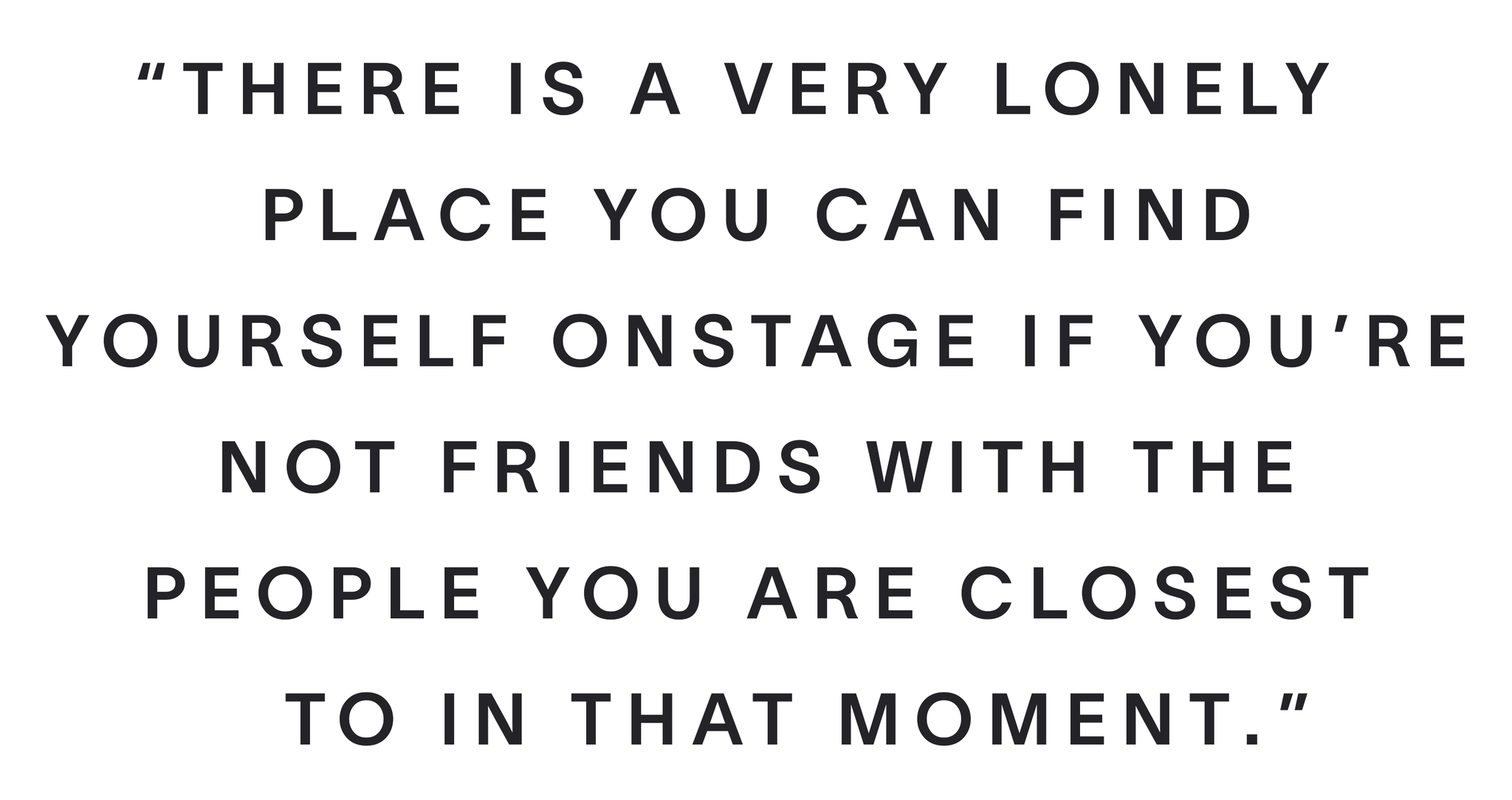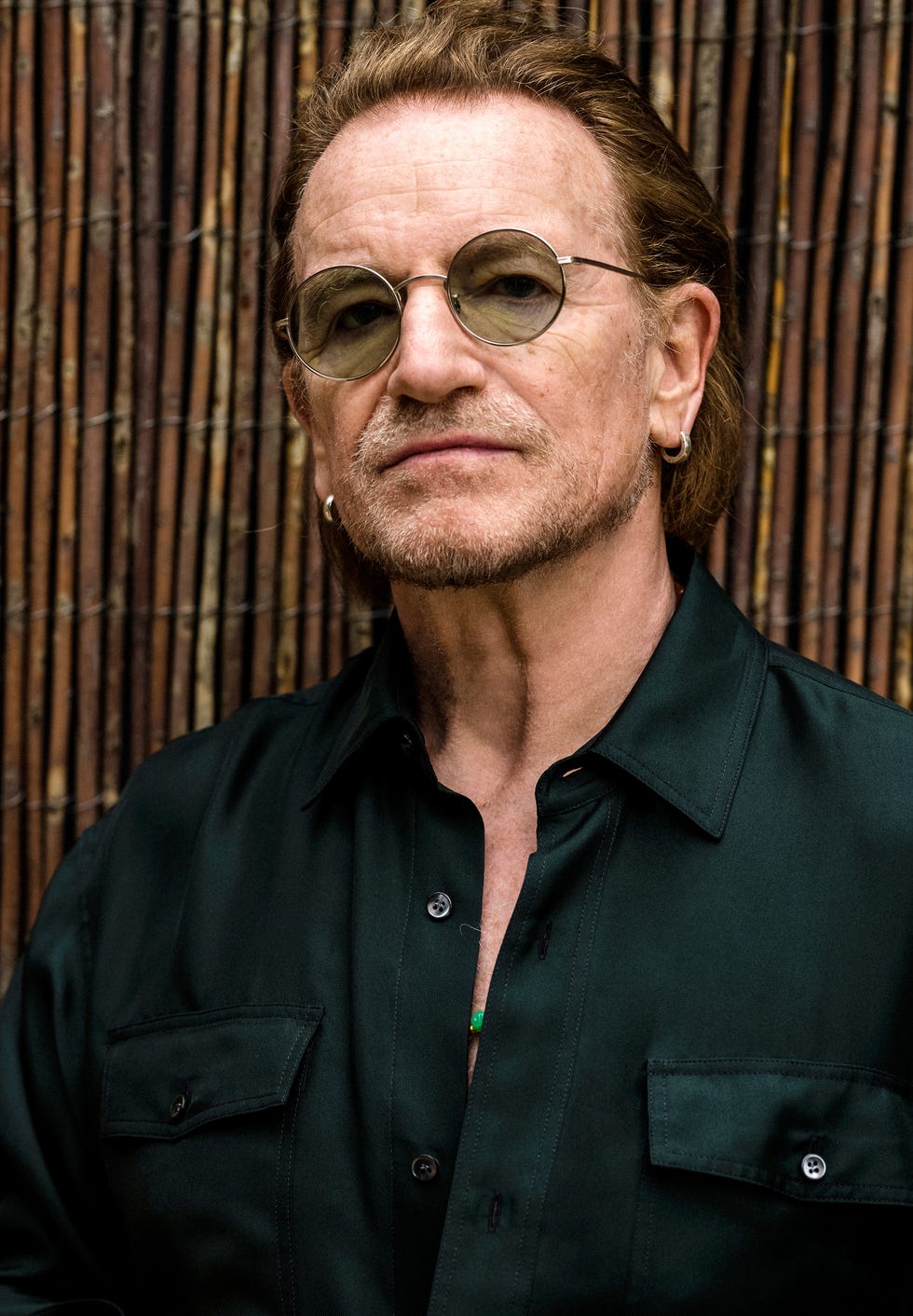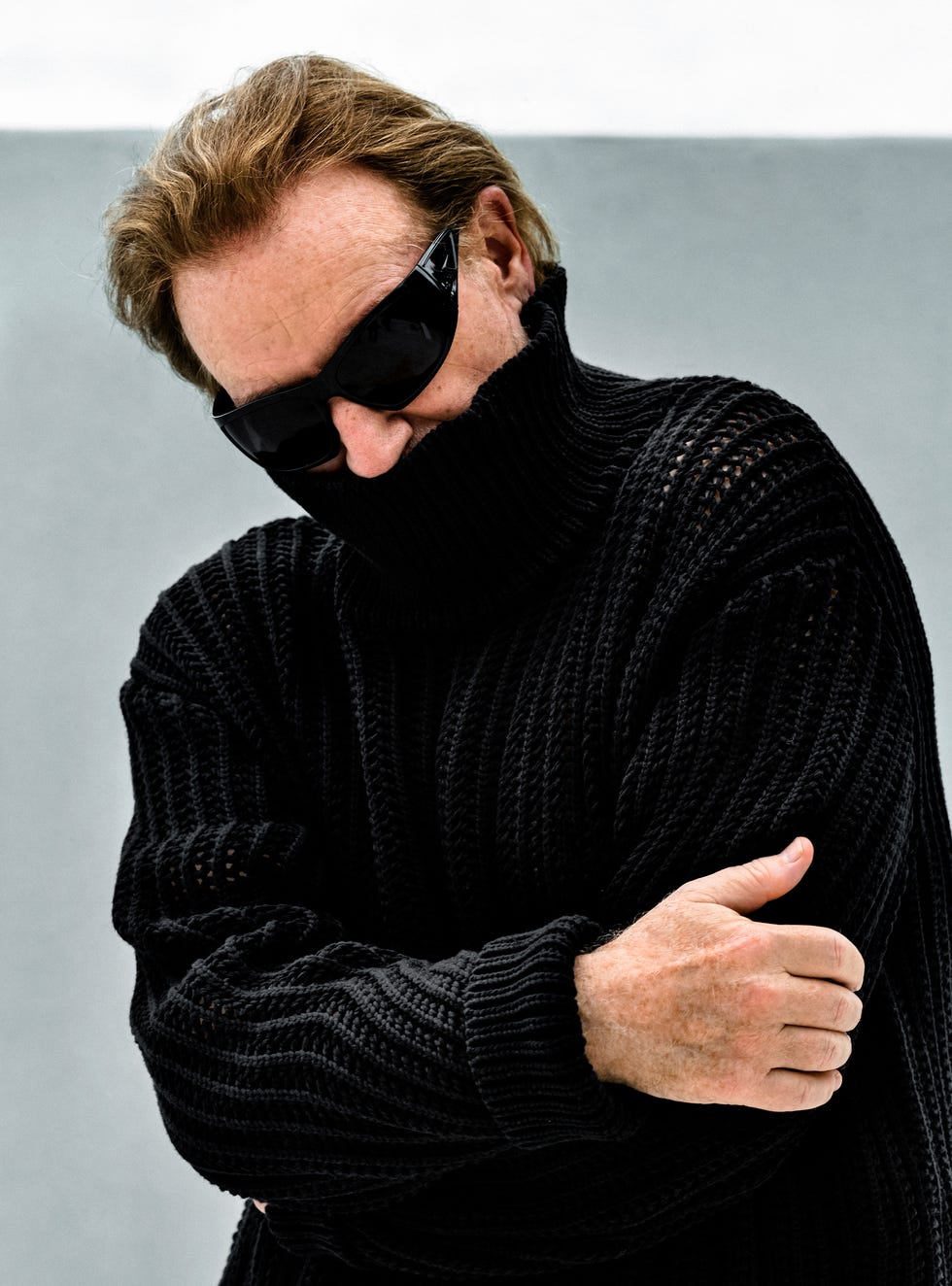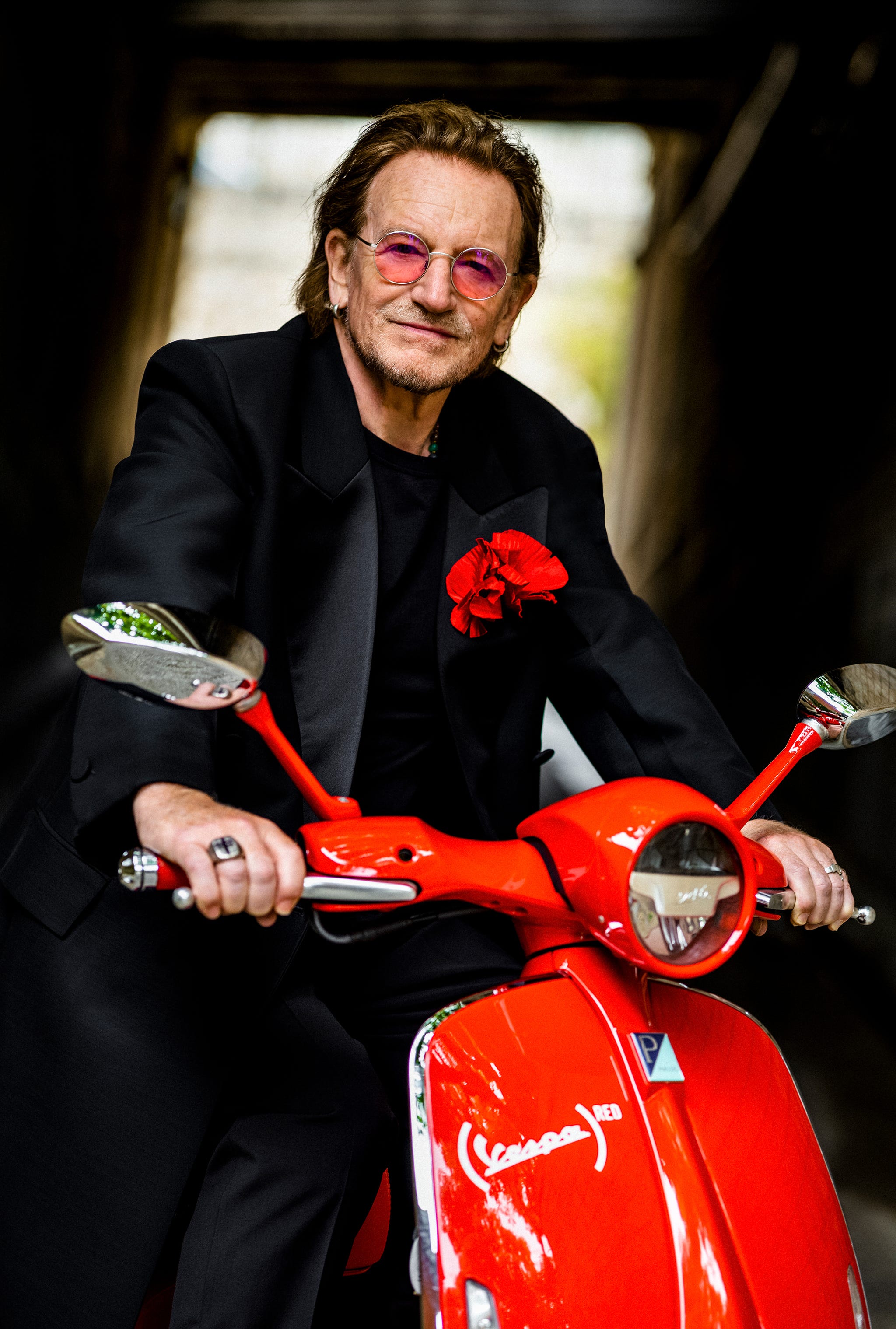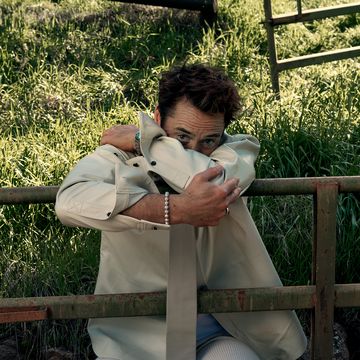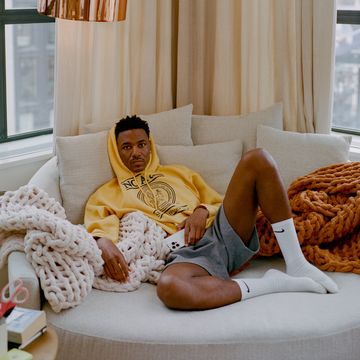“W. B. Yeats was buried just down the road,” says Bono near the end of our first afternoon together, name-checking the famed Irish poet. It’s early April and the U2 singer is walking me up the driveway of his vacation estate in the South of France, toward my waiting car. Behind us, the Mediterranean Sea fills the horizon, blue as far as the eye can see. His property stretches before us. A few houses. Couple of pools. It’s blissfully private, even if the glitz of Monaco and Cannes isn’t too far away. Bono is not the first Irishman to trade the dampness of his home country for the sunny shores of the Côte d’Azur—but he might be doing it better than the rest.
Bono shares the property with his bandmate the Edge. In the early nineties, they were driving by while on vacation with the other two members of the band when they noticed the grounds and stopped to take a look. Larry Mullen and Adam Clayton, the drummer and bassist who complete the legendary U2 lineup, wouldn’t even get out of the car. Owning such a place would be too much work, they said, way too much upkeep. But the frontman and guitarist couldn’t resist splurging. U2 was fresh off a ten-year stretch that saw the group go from buzzy new post-punk experiment to stadium-sized rock act, selling more than 70 million albums along the way. Which is to say, they could afford it.
It has indeed required a lot of work. Buildings have been added to accommodate their growing families over the years. On this day, one of the structures is wrapped in scaffolding and one of the pools has been drained. It’s part of the work to get ready for summer. But the idyllic hideaway has given more to Bono and his band than it has taken.
“This place saved our musical lives,” says Bono a few days later, sitting in one of the living rooms. The space around us is stunning but informal. Two big gray couches, a wall of windows to stare at the sea. A piano in the corner and a giant fireplace behind us. As comfortable as he is here, after all these years he hasn’t adjusted his wardrobe to the setting. While his neighbors are walking around in linen skirts and pastel vacation wear, he’s dressed like a rock star from Dublin in black jeans, a black V-neck T-shirt, and an army-green chore coat.
The decade that led up to buying the summer home had been thrilling, and exhausting. “You’re pushing a rock up a hill,” Bono says of what it takes to become the biggest band in the world. It had gotten to them all. U2 had grown into Serious Musical Artists. They hadn’t yet learned how to enjoy it. “We were slow to the groove,” he says.
And maybe it did save the music. Great albums certainly followed: 2000’s All That You Can’t Leave Behind, 2004’s How to Dismantle an Atomic Bomb. (We’ll leave the evaluation of 1997’s Pop, one of the more divisive releases in the group’s catalog, to each reader. This listener likes it.) But speak to Bono long enough and it’s clear that he found something else in the South of France. “It’s the antidote to one of my personalities,” he explains. The one that has chased the biggest music venues in the world, the trophies at every awards show, and new frontiers of music and visual expression for more than four decades. The one that has cofounded mission-oriented organizations like ONE, to combat poverty in Africa; and (RED), to fight AIDS, malaria, and tuberculosis; and DATA, which advocated for debt relief throughout Africa. The one that spearheaded campaigns for AIDS relief (PEPFAR).
This article appeared in the Summer 2025 issue of Esquire
“It wouldn’t be fair to say we could live an anonymous life here,” Bono says, “but the French are so respectful. You could almost forget that you weren’t anonymous.”
After thirteen years with a white-knuckle death grip on the steering wheel of their career, Bono finally learned how to take a breath. He embraced long lunches and late nights. Quality time with his wife and kids. And some partying too. “House parties, dance parties, our mates,” as he recalls of the early days’ scene. Bono flourished, finding lightness in himself for the first time in a long time. Maybe even ever.
Looking back, he might’ve gone too big. “I was going through the pure joy of having adolescence the wrong way around—having it in my thirties instead of my teens,” he recalls. “There was a moment where I had to ask myself, ‘Where is this self-love and where’s this self-indulgence?’ ” But he’s grateful all the same.
The families still come when they can, though mainly in the summer. School, work, their own careers—everyone’s busy. Bono likes when they’re all here. Rooms overflowing. “If you have a place like this, lots of people should use it,” he says simply. Bono and his wife, Ali, have four children, stretching between ages thirty-five and twenty-three. The Edge has five; some of them have started adding grandchildren to the pile. What do the Edge’s grandkids call you? I ask. Bono seems surprised by the query. “Bono,” he says after a pause. He knows it might sound silly. “You have to remember,” he adds, “Edge’s mother used to call him Edge.”
Mainly, he spends a lot of time here alone. “Working like a dog, living like a shih tzu,” he quips.
This week is no different, though he’s welcomed me into his home to discuss his excellent new film, Bono: Stories of Surrender. Shot during his one-man stage show that ran between late 2022 and early 2023, it is a striking, highly vulnerable adaptation of his memoir, which was also released in 2022. The work premiered at Cannes Film Festival before its May 30 arrival on Apple TV+ and Vision Pro. Cynics might view the project as another nostalgia-driven cash grab by an aging rock star. But that would be a fundamental misreading of the man and where he is in his life.
The last several years have been a time of recovery and reckoning for Bono, who turned sixty-five this spring. He made it past a serious health scare (one that he’d played down in public) and emerged with a more balanced perspective on how to enjoy the everyday pleasures in life. He faced demons from his youth that have fueled him throughout his career. And he reassessed his role in the nonprofit work that has captured so much of his passion and energy over the decades. He’s gone deep within himself and come out different. Better.
But as much introspection as Bono may have done here by the Mediterranean, it’s not in his nature to sit idle or live in the past. The relentless drive that has propelled the singer and his band for nearly fifty years now is very much still there. And much like in his early years in the South of France, he’s feeling newly energized. U2 is in the studio working on songs—perhaps the band’s first album of new music in nearly a decade—and his excitement about the material is palpable. Bono, it’s clear, has more stories to tell. And he believes the world needs to hear them.
He never planned for his one-man show to become a multimedia onslaught. The dates were already set for his performances when Apple Studios first arrived with its pitch to film the show. Still, it didn’t take long for the frontman and the tech giant to get carried away. Ideas for two versions soon emerged, a made-for-the-screen version that primarily features the live show as well as an immersive version for the Vision Pro that features illustrations Bono drew himself. “It became more of an undertaking,” Bono admits. “All of this stuff does. It does!” Director Andrew Dominik came onboard shortly after, and from then on, “it was no days off.”
As one fourth of U2—a band in which, famously, everyone has equal say and an equal stake in the revenue from the music—Bono has spent much of his life locked in a game of creative tug-of-war. But the filmmaker behind Blonde and Killing Them Softly pushed the singer in ways he didn’t expect. Making Bono rip at the scars left by the death of his mother and his difficult relationship with his father in ways even writing his memoir hadn’t. The results aren’t just in the work; they’ve had a butterfly effect on his whole life—setting him free of decades’ worth of pent-up rage and resentment.
“The only place we disagreed,” Bono recalls of the director, “is that Andrew wanted to make a documentary around the show.” It felt unnatural. His bandmate helped him articulate why: “It was Edge, actually, who told Andrew, ‘You find Bono onstage. You’re not going to find him backstage.’ ”
Bono is many things—a rock ’n’ roll salesman and an activist, a showboat and a charmer, a campaigner and a lightning rod. No one has ever accused him of being an actor. And Dominik wouldn’t tolerate anything that felt performative. While they were rehearsing one particularly intense set piece, Bono recalls standing up on a wooden table (in that moment representing a hospital bed) and playing both himself and his father, Bob Hewson, during his father’s final breaths. He was going for it—screaming his father’s final, explicit words—but it wasn’t enough for the filmmaker.
“Nah, mate, you’re acting!” Dominik would shout.
“There’s no one there!” Bono would bellow back. “What am I gonna do?”
Dominik’s reply: “Not act.”
Did it work? I ask.
“Well, you’ve seen it.”
How are you feeling, waiting for the film’s release?
“I feel a bit of nausea,” he admits. “And I really am fed up with the protagonist.”
The origin story of U2 has become part of the band’s mythology over the decades. In 1976, fourteen-year-old Larry Mullen Jr. hangs a flyer on the bulletin board of his Dublin high school, Mount Temple, reading, “Drummer seeks musicians to form band.” Paul Hewson, David Evans, and Adam Clayton all show up. Mullen knew how to play his instrument, the drums. And Evans (you know him as the Edge) was showing early signs of guitar-god talent. Clayton had attitude. And Hewson was desperate—for community, mainly.
Hewson, who would soon after embrace the nickname Bono, was still reeling from the loss of his mother two years prior. “This guy was really, really, really alone,” recalls childhood best friend Gavin Friday, who, before founding the band the Virgin Prunes in 1977, lived down the block from Bono. “It’s why our friendships became so tight.” Bono’s father, Bob, was just forty-eight at the time of his wife Iris’s death and quickly embraced a life out on the town. Bono’s brother, Norman, was seven years his senior, living a much more adult life. And then there was Bono, without a whole hell of a lot to do, at home. Each man coiled into himself. After Iris died, the three men never spoke her name again.
Bono’s charm and moxie kept him afloat in the years that followed. “On Fridays, we always had fish and chips—you don’t eat meat on Fridays back in old Catholic Ireland—and he would ring the doorbell at five minutes to six o’clock,” says Friday. “He knew I would be sitting down with my three brothers, and my mom would answer like, ‘Oh Paul, come in, come in,’ and she’d make him a plate.” He’d rush out soon after, Friday adds. “He was doing this with three other families on the block!”
Friday laughs at the memory, but he tells the story for a reason: “Man, what a survivor,” he adds as his laughter fades. “How hard it was for this little boy to be alone in this house—no mother, no father, no brother, no money.”
Bono struggled with Bob. He never felt like he got any attention at all. And when he did, he felt cut down by his father’s barbs and one-liners. It put a fire in his belly—not just to get off Cedarwood Road or even out of Dublin but to become something so big, so undeniable, that even Bob Hewson couldn’t look away.
In some respects, this worked. His band has sold 175 million records at last count and racked up twenty-two Grammys. He’s fronted a stadium act for more than four decades. He has had homes in Dublin and France and New York and Los Angeles. In others, it fell short. Says Friday: “I have a memory of being at the Joshua Tree show in New York and I was standing beside Bob Hewson. And Joshua Tree was going off, and the crowd was just euphoric. And I touched him and said, ‘You must be so proud of your son.’ And he said, ‘Yeah, I am, but I’m not going to tell that fucker.’ ”
When Bob died in 2001, Bono was still mad at him. He struggled to explore the depth of his emotion, but when his wife told him that she always thought that the original spark of his anger was that Bono blamed Bob for the death of his mother, something clicked. Maybe it had also been tough for Bob, he realized. Maybe a raging teenager living down the hall didn’t help. Maybe it even made staying home too painful to bear. A year later, around Easter, Bono wandered up the hill near his home in France to a little chapel. He got down on his knees and asked his father for forgiveness. “I was expecting the apology,” recalls Bono, “but I think the conversation had been the wrong way around.”
Healing finally began. Writing the memoir helped, but the stage show has been the most therapeutic exercise yet. Performing his father’s well-worn lines—his disses and jabs, which hurt so much in real time—in front of an audience and earning laughter in return surprised him. “I realized it was his sense of humor,” he says. “My whole life it came across as only cutting, but I realized how very funny it was.”
He realized a few things about himself as well. “That I had been a little humorless,” he begins. “I should have laughed more rather than be so hurt by it.” (Elsewhere during our time together, he considers just how important laughter has become to him. “I’m starting to realize that I don’t trust people who don’t make me laugh . . . and I wonder, was I one of them?”)
He also began to consider that his burning need to set the world right—to help God across the road as if she were a little old lady—is maybe also something Da deserves a little credit for. “I started to realize that all of those arguments that we used to have at the kitchen table, he was always on the side of social justice,” he says. “He owns that part of me.”
So few of us see our parents clearly while they’re still here, but it’s palpable just how much Bono wishes he had. That he’s gotten where he is now—to this place of peace—is a relief tinged with sadness. “I began to really like him, as well as love him,” he says of what changed in him during the performances. In time, “I even began to miss him.”
Let’s get one thing out of the way: That you like Bono is not a given. He knows that. The most provocative member of one of rock ’n’ roll’s most provocative acts, he has divided audiences since U2’s third album, War, which explored the aftereffects of a youth spent surrounded by political violence. “Sunday Bloody Sunday,” about the 1972 afternoon when British soldiers opened fire on a crowd of civilian protesters in Derry, Northern Ireland, became a career song for the group, propelling the LP to become the band’s first number-one album in the UK. It also became a road map for the rest of its tenure.
Throughout the band’s debut and follow-up (Boy in 1980, October in 1981), Bono, the Edge, and Larry Mullen Jr. were locked in a personal religious struggle. They’d fallen in with a church of Christian fundamentalists, called Shalom, and their calling to Jesus was increasingly difficult to square with something as flip as sex, drugs, and rock ’n’ roll. As their profile continued to rise, so did their pastor’s displeasure. Tormented, they decided that to stick with this business, they’d have to make their music mean something.
One problem: Meaning it isn’t very rock ’n’ roll. It remains U2’s original sin, for many, that they have never pretended not to care. They have never been effortless or cool in a Keith Richards kind of way, and there is nothing accidental about their reign. Sincere to the point of being earnest, occasionally even sanctimonious, they have tried hard the whole time and told you all about it. They have declared that rock ’n’ roll could change the world and then acted like it—writing songs about political conflicts, international relations, and justice. They have desecrated flags and spat at world leaders from their stage.
It has yielded a particularly complex relationship with their home country. Growing up during the Troubles, U2 spent much of their early career screaming for peace. Advocating for nonviolent methods of protest and demanding that the international community stop funding organizations that supported violence in Ireland. “For certain people of a certain generation, we carry a lot of baggage,” he says. “And for some people, we’re helping them with their luggage.”
Certain controversies haven’t helped. Accusations of tax avoidance have burbled over the years, though Bono has always been quick to remind people that nothing they’ve done is illegal—and that they do indeed pay a shitload of taxes. And then, of course, there was the iTunes gifting fiasco in 2014, in which all platform users received a free copy of Songs of Innocence in their libraries on release day, whether they wanted it or not. Bono didn’t see that reaction coming but takes all the credit for the decision.
“He’s very open to the fact that he may have done things correctly or not correctly,” says record-label boss and Beats cofounder turned Apple music exec Jimmy Iovine. Iovine first met U2 in the mid-1980s, before they broke big in America, and says he chased them all the way back to Ireland, begging them to work with him. “He’s one of the most honest people that you could possibly work with. No matter what happens, Bono doesn’t blame anybody. He takes full responsibility for everything in his life.”
By the third time Bono mentions the two-pronged reaction to his band (“We were loved and loathed,” he says, “it really was both”), it occurs to me that he may get some enjoyment out of the idea that there are so many people who don’t like U2. As he sees it, that’s part of the job. “They say sometimes, you know, ‘You better have your armor on. You’re about to walk out and get killed.’ Isn’t that what you’re supposed to do?”
In 2016, Bono was flat on his back, chest cut wide open, in the operating room of Mount Sinai Hospital in New York City. He was undergoing open-heart surgery to fix an aortic aneurysm, a condition that arose due to an irregularly shaped valve. It was something he’d lived with his whole life, but now, due to wear and tear, there was a chance it could kill him.
Recovery was hard, and the massive thirty-year-anniversary tour for the Joshua Tree album loomed. “The loss of air” is what he remembers most of the aftermath, a complication that arose following the successful operation. Four decades of sprinting around stadiums while singing—screaming—had given him a lung capacity far greater than his peers. But Bono suddenly felt like he’d lost control of the intake. “It terrified me,” he says. “I’d never been so terrified.”
His inner circle suggested that he cancel the shows, but Bono wouldn’t hear of it. And for the first time in his career, maybe even his life, he accepted his limitations. He kept the dates but stood still during performances. He was surprised by the results. “The singing improved,” he admits. “I started to realize I had just been shouting for a living,” he says.
It’s only gotten better in the years since. And now, in his seventh decade, he feels like he’s painting with entirely new colors. “I had better find some really great songs for it,” he says. Luckily, he can control that. “That’s on me and my mate,” he remarks, referring to his songwriting partnership with the Edge. “And guess what? There’s nothing else that he or I want to do that comes close to it.”
Bono’s surgery wasn’t a secret, but in the years that followed, he resisted reflecting on it in interviews. Today, relaxing on his couch, he says he’s “so grateful” for the episode. Health scares have a way of immediately putting your priorities in order, after all. They tend to make you stop and appreciate what you have and how you got there. For Bono, that meant freeing him to finally look back and examine the different stages of his remarkable life. The 2017 Joshua Tree anniversary tour, the memoir, the insular 2023 LP Songs of Surrender, the Achtung Baby revival at the Sphere—it all culminates with Bono: Stories of Surrender. “I don’t believe in destiny, but it happened in the right order,” he says. “You wouldn’t want to stay there too long, but you do have to acknowledge where you came from, at a certain point.”
Following his operation, Bono’s family had what sounds like a lifestyle intervention. Their message was clear: “You have to think more about regular life.” It was time, they argued, that he stop and smell the proverbial roses. What is regular life? “Genuinely,” he recalls, “they said, ‘Things like watching TV.’ ”
Someone in his office recommended the Chef’s Table docuseries. “I said, Come on, you cannot be serious,” recalls Bono. “I’ve got to watch Chef’s Table?” Assuming you, like me, are very much a person who engages with regular life (TV), I am certain you can guess how this story ends: Bono’s first Netflix binge. He loved the episode that followed Evan Funke through Bologna (“he’s got a great value system”) and the one focused on Jeong Kwan, a Buddhist nun who cooks for visitors at her temple (“incredible!”) and, of course, the Francis Mallmann installment (“I’m like, wow. And I had just met him on tour”).
His eldest, Jordan, got him into Fleabag. His second daughter, Eve, an actress who has found onscreen success in Bad Sisters and The Perfect Couple, introduced him to The Kardashians. At some point, he even caught some Love Island. He slowed down. Said no. Not as much as he should, but more than he had. “I’m not very good at that,” he admits. And as his foundations (RED) and ONE chugged along, he finally reconsidered his involvement. “Maybe I should fuck off into the background,” the thinking went.
Bono founded ONE in 2004 and (RED) in 2006. They are as much his life’s work as his music is. But in late 2023, Bono stepped down from the shared board. He knew it was time to promote a new generation of young activists. And, as he says, at this point, “I’m the wrong sex, wrong age, wrong color, wrong ethnicity, and I’m not African.” Still, it’s obvious how hard the decision was. Is. “You need to find your place, don’t you? Where to be useful. I had found a place where I could be useful,” he says. He misses it.
Maybe it’s his messiah complex. He can admit he has one. “Any rock star worth their salt has to,” he says. But it’s also this moment in history. “The most unbelievable carnage imaginable is happening to our work at (RED) and ONE,” he says of the careless slashing of USAID and other global relief efforts by the Trump administration. “These are the brightest, best people, who’ve given their lives trying to serve the poorest, most vulnerable communities, and they’ve just been thrown in the dumpster.”
Bono has worked well with both Republican and Democratic administrations during his tenure. It’s something he’s caught flack for from the left over the years, especially his willingness to partner with George W. Bush during the Iraq war, but, to be frank, Bono doesn’t give a shit. The AIDS relief orchestrated alongside W. is the largest single-issue health intervention in the history of the United States. What’s a few hits in the headlines against that? On the global political ideological spectrum, Bono does not consider himself a liberal. “I describe myself as a radical centrist,” he says. “And I am sure that that sounds absurd, but I am also sure that is how we get through the future. What’s being served up on the far left and on the far right is not where we need to be.”
At first, the Trump administration challenged his resolve. In time, it changed his worldview. Prior to 2016, Bono says he frequently meditated on a particular Martin Luther King Jr. quote: “The arc of the moral universe is long, but it bends towards justice.” He no longer believes that today. “We have to bend it,” he says. “Through sheer force of will.”
But staring down this current reality, he admits, “I don’t know how to proceed.”
For forty years, Bono has been one of the loudest and best-known advocates for globalization. He has staked his reputation, a lot of his money, and a lot of other people’s money on the belief that the more blended the world becomes, the better off everyone in it becomes. He watched it raise Ireland out of poverty, and he’s seen it bring industry and infrastructure to Africa. Ten years ago, we were, he felt, on our way to solving a lot of the world’s problems. And now he is watching as a violent snap back toward nationalism has spread across continents. “I’ve been very angry,” he says. “But you don’t have the luxury.” There’s too much at stake.
He is particularly disturbed by what’s happening in the U. S. “The United States has been a promised land to a lot of people, but it looks like it’s about to break that promise,” he says. “I can understand people coming to a place where they say, ‘I don’t see why the United States has to pay for aid, drugs, or anything else in places far away where there is no vote.’ I think that position is dumb. I think it makes a lot of geopolitical troubles for you down the road, but I can understand it.”
What he cannot accept is “the delight that was taken in the destruction of life-support systems—pulling them out of the wall—that’s the clue to the true nature of this. Evil walks amongst us, but it is rarely this obvious.”
Bono has a few life rafts he’s clinging to. First, that this may be the moment that truly unites Europe. “I always say, ‘Europe is a thought that needs to become a feeling,’ ” he says. “We’re 450 million people—we’ve got a lot. And if we can keep the European project a romantic one, that could be a great thing.”
And second, “I believe the old adage that if you give Americans the facts, that they will make the right choice. Problem is getting them the facts, especially right now.”
And third, “I’ve got to believe that freedom is more fun,” he says. “You see these people—they don’t look like they’re having any fun. You need that anarchic spirit to change the world. Pot-smoking, opinionated, fun, adventurous people like Steve Jobs. Einstein sticking his tongue out. You don’t get that in autocracy. We’ve got to bring freedom with us, everywhere we go.”
“You didn’t happen to see that Jeff Bridges interview recently, did you?”
Bono is asking me about a recent sit-down the actor had with The Guardian, where he discussed, among other things, how all of life is really just one big search for harmony. Harmony in music but also in the rooms you stand in and the groups you associate with. “He said, ‘Like, trees and flowers are magic,’ ” recalls Bono. “And I knew exactly what he meant. I was laughing and had tears in my eyes at the wisdom of the man.”
It’s an idea Bono comes back to several times as we speak. A week later, on Zoom, he’s asking me where I live and, once he learns that I’m a New Yorker, if I go for walks in Central Park. Bike rides with Ali there were his favorite part of living in Manhattan, which the family did for a short time a decade and a half ago. “The great educator in New York is the park,” he says. “That’s university.” As so many things do with Bono, this conjures a broader reflection: “If I was doing all that again, I would be more open to the idea of the divine in everything.”
Following conversation threads with Bono is usually a journey and often an exercise in Old World literature and religious theory. (“Do you mind if I go on just a tiny tangent?” he asks more than once.) From memories of Central Park bike rides we move swiftly into the Franciscan idea that God’s goodness is present in all creation and then right along to Pope Francis’s 2015 encyclical, Laudato si’, in which the Catholic leader decries political acts that violate the earth and calls for radical intervention in caring for our shared natural home. It all connects, and we do, always, in time come back to the original prompt. “It’s a beautiful idea, when you start to see a walk in the park as a kind of cathedral,” he says.
But for all of Bono’s ability to get carried away by big ideas—you’ve heard a U2 song, right?—he remains remarkably self-aware. He can pull his most lofty tangent right back down to earth, usually in the form of a punchline. “Of course,” he adds, “it’s also important to note that a tree can also just be a tree. It doesn’t have to be a lesson in Latin.”
It’s a curious thing, who survives the music industry and who doesn’t. Bono credits this sort of thinking—faith in the divine in everything, faith in Jesus Christ—for what has pulled him through. His community as well. “There is a very lonely place you can find yourself onstage if you’re not friends with the people you are closest to in that moment,” says Bono. “I have my friends in the band.”
He also has his wife of forty-two years: “I have a partner who is just wisdom.”
And one very good lesson from Chrissie Hynde. “I remember her saying, ‘Hey, let’s not die stupid,’ ” he says. “ ‘Not in a swimming pool, choking on your own vomit. Come on, man. You know what’s really great? Living a long life. That would be great, wouldn’t it?’ ”
Like most dads, Bono lights up when you ask about his kids. Every sentence is suddenly punctuated with a laugh. He dotes on them, even now that they’re grown. “If I was shaped by trying to get my father’s attention,” says Bono, “those kids have been somewhat shaped by trying to get their father’s attention off of them.”
Bono and Ali could have raised their kids anywhere and sent them to any fancy school. Instead, they returned to Dublin. Yes, they bought a big house. But they sent the kids to a free, nondenominational school that sounds an awful lot like the Mount Temple of their own youth. (They gave that alternate reality a go with their younger two children for a couple years in New York, where the kids attended the prestigious Dalton school. But as Bono recalls, “After a while, the boys came back saying, ‘Our heads hurt a little bit. Can we go home to Ireland?’ ”)
They take comfort in the fact that Dublin does not bend around them. That the chances a neighbor loves or hates U2 feel evenly split and where, as a culture, “being wealthy does not make you interesting.” As Gavin Friday puts it, “The Irish are pretty good at bashing their own.”
When the whole family is together, Bono finds himself on the sidelines. Eve and John, the second- and fourth-born, are “the two comedians.” Jordan is a force. And Elijah, a rock singer like his dad, draws the eye. “He is uninterested in cool,” Bono says of the twenty-five-year-old, who fronts the Irish rock band Inhaler, “but I think he might bump into it anyway.”
Ali is gravity, for everyone. “I need an appointment to see her,” Bono jokes. “I was just observing her over the weekend. I’m just fascinated by her. She’s so easy with herself. If you were in the room—this has happened to me so many times—at this point you would be saying, ‘Listen, dude, I can see this PEPFAR thing is really upsetting you. You just need to go work out your feelings. Your wife and I are just going to go have a glass of Chablis.’ ”
Bono met Ali the same week he met U2. All this time later, he remains stunned by his luck. “How absurd that I fell in love with her the moment I saw her?” he says.
These days, he seems almost overwhelmed by the fact that he gets to watch his kids’ dreams come true. He also wrestles with how much of their lives he spent away on tour or in Africa doing the nonprofit work. “They ask me serious questions that can make me uncomfortable,” he admits. Like what? “Do you know where you were on my eighth birthday?” He gives Ali most of the credit for how everyone turned out, but it’s clear what pride he takes in the fact that they are guided by the same north star as he is: “All of them gather around a prayer, and the prayer is to be useful,” he says.
I point out that he attributes so much of his ambition and success to wanting to prove his father wrong. But his children are thriving after being raised in a warm, affectionate, privileged home. My question hangs between us: What if the relentless drive for more is just who you are?
When Bono is considering something deeply, his mouth will often start moving seconds before any words emerge. As much as he is a lively conversationalist, he’s prone to pregnant pauses as well. Sitting and chewing on a thought before he shares it. He does that now.
“You don’t want what I have,” he says finally. “I’m really grateful for the fire in my belly and whatever kind of pugilist it made me—to try and put a finer word on a man who can just throw a bad punch in a pub. But I would say all of our kids have a deep desire to do something with their lives . . .” He doesn’t really finish the thought, but he winds himself back around later. His children can each engage and disengage, healthily. Recognize their privilege and then dismiss it. Pray about making themselves useful and then tear through a season of reality TV.
But the Off button has always been just out of reach for Bono.
“Did I play you that song the last time we spoke? It was in my head—‘Freedom Is a Feeling.’ ”
Bono didn’t play it for me—what sounds like a brand new U2 song—and he doesn’t play it for me now, on Zoom. Instead, he begins singing it. “Free-dom,” he coos at the high end of his register, “is a feeeEEling.”
It is both the soundtrack to and the result of the current creative quest Bono finds himself on. The band is back at work, recording new music. As soon as we hang up, he will return to the studio, where everyone is waiting. “The thing is,” Bono says, “I don’t just want to be singing about freedom. I want to be freedom, the feeling. That’s what rock ’n’ roll has to be.”
It’s exactly the sort of lofty, idealistic talk that Bono naysayers have rolled their eyes at over the years. But there is that thing that U2 does—when Bono is singing above the music, all emotion, carrying a chorus bigger than the biggest music venues on the planet—that, no matter how many times you’ve heard whatever song it is, achieves liftoff, in you and anyone nearby. Which is to say, it’s possible.
The frontman has been teasing a full-tilt U2 rock record for a number of years now. (“Where is it?” I ask. “Madison, you are such a buzzkill,” he retorts.) But there is finally reason to believe that fans will hear the set sooner rather than later.
In recent years, drummer Larry Mullen has been struggling with back pain—you hit things for a living, eventually they hit back—while Bono has been working through his own individual story. “We were a little broken,” he admits. “There was a period of reflection where we had to figure out, do we have anything to offer?” Bono’s glad the answer they arrived at is yes.
Which means Bono is ready to return to the perch he does better than the rest: hype man. “We’ve got a band unlike any other—good or bad—but unlike any other,” he touts. “You have a guitar player who’s clearly otherworldly, you have a drummer who has returned from agony who is now in ecstasy, and Adam Clayton, who is the only member of U2 with enough courage to have an almost handlebar mustache at this point.”
It’s early days, but Bono can’t believe how good the new material sounds. “Everyone in the band seems desperate for it,” he says. “It’s like their lives depend on it.” He pauses briefly. “And, as I tell them, they do.”
They are working with Brian Eno again—the superproducer behind The Joshua Tree, Achtung Baby, and Zooropa. And, as he was during the writing of 2000’s All That You Can’t Leave Behind, Bono is currently consumed by a desire to return to the essentials. Referencing the earlier collection, he says, “The most important line on that album is ‘I’m not afraid of anything in this world / There’s nothing you can throw at me that I haven’t already heard.’ ” Bono wrote the song thinking of his good friend Michael Hutchence, frontman of INXS, who died by suicide in 1997. He sees it now as a fraught exploration of the male perspective. “That’s really on my mind at the moment,” he admits.
The Edge is right about this: You find Bono onstage. “I’m the only one who doesn’t like recording,” Bono says. “I just like to play live.” And in 2025, where what constitutes a successful music release is more confusing than ever, Bono is judging according to just one qualification: “If it provides us with a reason to leave home.” Tour. “You want to have some very good reasons to leave home.”
“I hope they’re going to still be there for us,” he muses of their audience. “We’ve pushed them to their elastic limit over the years. And now it’s a long time that we’ve been away. But I still think that we can create a soundtrack for people who want to take on the world.”
U2 has closed countless shows over the years with “40,” from 1983’s War. Like many of their best songs, it is a musing on a question Bono can’t stop asking himself. Here, he wonders, “How long, how long, how long / How long to sing this song?”
A little while longer, it turns out.
In the opening photo: Jacket by Dries Van Noten. Sunglasses and jewelry, Bono’s own.
In the cover image: Coat, trousers, and pin by Ferragamo; T-shirt by Dries Van Noten; sunglasses, shoes and jewelry, Bono’s own.
Story by Madison Vain
Photographed by Anton Corbijn
Styled by Anastasia Barbieri
Grooming by Natalie Kinsella and Hannah Rankin
Production by Michaël Lacomblez at Louis2, Paris
Esquire Visual Director: James Morris
Esquire Design Director: Martin Hoops
Esquire Entertainment Director: Andrea Cuttler
Special Thanks to Sharon Blankson

